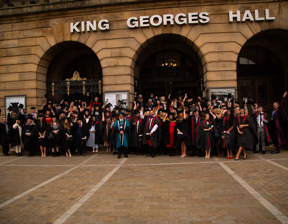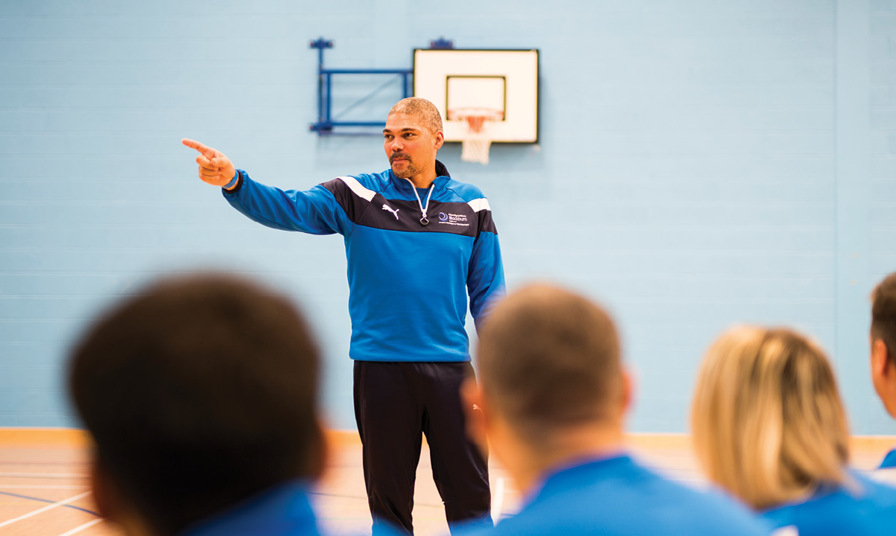Entry Requirements
You’ll need to have gained our FdSc Sports Coaching or have a HND or Foundation Degree in a relevant subject area such as Sports Coaching or Sports Science. You’ll also need to demonstrate the ability to study at this higher level and have a high level of English skills for the successful completion of the course.
Study Mode
Full time
Duration
Full time
1 year
Timetable
Check with your tutor
Key Features & Benefits
- Have lessons taught in both the University Centre and at the on-campus Blackburn Sports and Leisure Centre.
- Develop your industry experience and enhance your employability.
- Be taught by industry specialists who are highly regarded in their field.
- Experience a large array of sports to offer you the flexibility to work in many sporting sectors when you graduate.
Our BSc (Hons) Sports Coaching (Top up) is designed for students who have successfully completed the FdSc Sports Coaching or students who hold a foundation degree or HND in Sports Coaching, Sports Science or a related subject area, to top up their qualification to honours level. This is through an additional period of one year full-time study or two years part-time study. Validated by the University of South Wales, our BSc (Hons) Sports Coaching (Top up) is designed specifically for students who wish to move on to higher level positions in sports coaching and performance, sports development or physical education.
-
Overview
Our BSc (Hons) Sports Coaching (Top up) is distinctive in that a range of employers and industry experts have been consulted in the creation of the programme. The course will develop your skills in a range of disciplines and has a large focus on developing you as both a critical thinker and a researcher. The course provides you with the opportunity to develop your coaching skills, knowledge and performance as well as increasing your understanding of the coaching process. You will be encouraged to engage in high level applied sports theory and practice and through a variety of lectures, seminars and practical sessions, you will develop your knowledge of current thinking within the field of sports coaching. The overarching taught themes will allow you to succeed in Sports Coaching within any sport. You will have the opportunity to experience coaching in a large array of sports such as football, hockey, basketball, netball, cricket and many more.
Guest speakers including athletes, professional industry coaches and industry specialists will also contribute to the programme to give you real insight into this exciting and dynamic industry.
-
What will I study?
You will be required to complete five modules as part of the programme including Applied Sports Coaching, Elite Sport Performance and Creatively Teaching Physical Education. You will also complete a dissertation as part of the course which will enable you to specialise in an area of your choice through consultation with your dissertation supervisor.
This degree offers module options in order for you to tailor the programme to suit your future career ambitions. It is a key component of each module to promote independent and critical learning and assessments are designed in a way that will enable you to develop your own ideas in your chosen area of interest. At Level 6, you will undertake a core set of mandatory and optional modules.
Throughout the programme you will have the opportunity to work with a range of people from different sporting backgrounds with a wide range of experiences including your peers, the lecturers, a range of specialist employers within the community and guest speakers.
During the programme you will find that there are some additional costs. These include:
£100 (estimated cost) of the Sports Uniform to be worn by all Sports degree students.
Level 6 Modules (there are 4 mandatory modules and 3 optional modules as indicated by* of which you can choose 2) include:
- Applied Professional Practice (subject to validation)
- Applied Sports Coaching
- Leadership in Sport (subject to validation)
- Critical Issues in Sports Coaching and Leadership
- Elite Sports Performance*
- Creatively Teaching Physical Education, Health and Wellbeing*
Optional Modules
If we have insufficient numbers of students interested in an optional module, this may not be offered. If an optional module will not run, we will advise you as soon as possible and help you choose an alternative module.
-
Entry Requirements
You’ll need to have gained our FdSc Sports Coaching or have a HND or Foundation Degree in a relevant subject area such as Sports Coaching or Sports Science. You’ll also need to demonstrate the ability to study at this higher level and have a high level of English skills for the successful completion of the course.
Care Leavers or Young Carers
We want students from all backgrounds to have the opportunity to go to University. If you have spent three months or more in local authority care OR are a young carer, you will be eligible for a contextual offer. This is a grade reduction of 1-A Level grade below our standard entry requirements. For example, a standard offer of CCC, would become CCD. MMM at Level 3 Extended Diploma would become MMP. To apply we advise that you tick the box on your UCAS application which identifies you have spent time in care and to help identify you as eligible for our contextual offer.
-
How will I be assessed?
Throughout the course, a full range of assessment techniques will be used. You could be assessed by examinations, including open-book examinations, practical assessments, assignments, briefs, essays, presentations (including group presentations), reports, work-based assessment and portfolio building. This formal assessment will count towards your module mark and feedback is usually given within four weeks following the submission of your formal submission of work.
Additionally, some lecturers will provide informal feedback, for example, following an examination they may choose to work through the exam paper in a tutorial. It should be noted that feedback is part of the ongoing learning cycle which is not limited to written feedback. Other forms of feedback include one-to-one meetings with a personal tutor, dissertation and project supervision meetings, a lecturer responding to learner questions or responses during topic or situation discussions.
Feedback is intended to help you learn and you are encouraged to discuss it with your module tutor.
-
Teaching and Learning
The learning environment and facilities could include lecture theatres, classrooms, technology suites, laboratories and workshops, library and skills labs, art and photography studios, small group and quiet zones. Learning methods will vary according to the programme of study but will include lectures and group tutorials. In addition, seminars, field trips, work placements, role play or scenario activities, laboratory and workshop practical, demonstrations, guest lectures, discussions and debates all contribute to the learning experience to support the acquisition of subject specific skills and knowledge and the development of transferable and employment related skills.
You should typically expect to have around 15 contact hours per week if you are studying full time.
In addition, you will have timetabled meetings with your personal tutor.
You will be taught by an experienced teaching team whose expertise and knowledge are closely matched to the content of the modules on the course. The team could include senior academics, professional practitioners with industry experience, demonstrators and technical officers. You can learn more about our staff by visiting our staff profiles.
Timetables
On this course, students generally spend up to 2 days a week in College, if you choose to study the course full-time. As all course timetables are subject to change you should not make definite plans based on this information; this information is intended as a guide only. Please remember that you will be expected to carry out work in your own time in addition to the time you spend in College.
Overall Workload
You overall workload consists of class contact hours, around 15 hours of independent learning and assessment activity and any field trips which may take place.
Academic Support
We have a dedicated Student Engagement Team who will be able to provide support in the following areas;
- Study Skills (including reading, note-taking and presentation skills)
- Written English
- Academic Writing (including referencing)
- Research Skills
-
What can I do next?
Some of the potential careers that this course can lead on to include work as an elite coach, performance analysis roles in a range of settings, sports development, community coaching, research roles and teaching in a variety of levels: Schools, Further Education or Higher Education for example, subject to the completion of an appropriate Post Graduate Certificate in Education (PGCE).
-
Supplementary Information
Supplementary Information
Work Placements
Work placements are subject to availability. You are also responsible for any costs in travelling to and from your work placements, for any accommodation costs and in some instances the cost of acquiring a satisfactory Disclosure and Barring Service (DBS) report.
-
Fees and Finance

95.8%
Highest in the area for students feeling supported by teaching staff in their learning.














